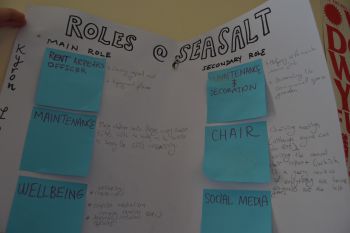Professor Anke Schwittay talks about her research with Student Housing Cooperatives
By: Carol Brailsford
Last updated: Tuesday, 11 February 2025

Prof Anke Schwittay


2025 is the UN International Year of Cooperatives, designed to raise public awareness of the contributions of cooperative enterprises and promote the strengths of the cooperative as an alternative way of doing business.
What better way to raise awareness than to highlight the research of Professor Anke Schwittay, Professor of Anthropology and Global Development in the School of Global Studies, and newly appointed Associate Dean for Global and Civic Engagement, Faculty of Social Sciences.
Prof Schwittay’s current research focus is the work of student housing cooperatives in the UK and globally, which began when she learned about SEASALT, the Sussex University student housing cooperative set up in 2021, from one of her students. Realizing the hard work, often over many years, that students undertake in order to establish their own housing coops, Professor Schwittay has developed a long-term, action research project to learn more about them and help them grow.
What are student housing cooperatives?
These cooperatives are grass-roots movements borne out of the need to build an alternative to the increasing financialization of student accommodations, and provide affordable, safe and democratic housing for students.
2024 celebrated the 10-year anniversary of the first UK student housing cooperatives in Birmingham and Edinburgh. SEASALT (South-East Students Autonomously Living Together) is the only cooperative in the South-East, and in 2025 the newest coop will open its doors in Glasgow.
Whilst the movement is slowly growing, there are many obstacles to students’ cooperative housing ownership such as identifying suitable properties, raising funds and, of course, an inevitable high turn-over of students creating difficulties with retaining expertise and momentum.
Why is research into housing cooperatives important?
Research is important to raise awareness of the cooperatives themselves, and the organisations and networks that support them to build collaboration, shared resources and expertise across the UK and globally. The coops present a different way of living for their student residents who undertake all the governance and management themselves through forms of spatial autonomy and direct democracy. They also provide a different relationship between students and their neighbours, being part of local communities rather than closed off from them in high-rise buildings.
That’s why for Professor Schwittay research also entails working with student activists and their supporters to grow the movement. Supported by HEIF funding, she co-hosted with SEASALT the 2023 conference on How To Grow Student Co-ops. The event brought together over 30 cooperators from the UK and Ireland, with organisations such Student Co-op Homes (the UK federation of student co-ops), The Brighton & Hove Community Land Trust, and many others to discuss the highs and lows, challenges and successes of the work of all the cooperatives, including those still actively looking for properties. More recently, Professor Schwittay set up the first academic Online repository of Research and Dissertations on student housing cooperatives to encourage knowledge generation and sharing.
Teaching and Learning
Professor Schwittay also teaches the MA Module “Activism for Development and Social Justice” and uses her research with housing cooperatives to get students to apply theoretical knowledge and critical thinking to problem-focussed learning. This term, students on the module will be designing activist campaigns focusing on the diverse ways in which more housing coops can be started in the UK, with the outcomes being shared directly with the cooperative network and feeding into future action.
In conclusion
Student housing cooperatives represent an important alternative to traditional student accommodations, showing that student housing does not have to be unaffordable and exploitative. They empower students to take control of their living situations, build community, and develop many skills that extend beyond their academic studies.
In the International Year of the Cooperative, we look forward to their continued growth and impact.
Upcoming events
4-6 June 2025, International Social Housing Forum, Dublin
Saturday 14 June 2025, Co-op Housing Tour, led by the Brighton and Hove Community Land Trust, of housing cooperatives in Brighton, including SEASALT
Ongoing photo exhibition in the Dhaba Café, University of Sussex
Further reading and resources
- Why we need more research on co-ops
- SEASALT in 15 pictures
- Co-op Chronicles: Celebrating 10 Years of Student Housing Co-ops in the UK
Academic resources:
- Online repository of Research and Dissertations
- Students take over: prefiguring urban commons in student housing co-operatives
- Prefigurative pedagogies: Learning to build alternative futures in student housing co-operatives
Further information: https://heyzine.com/flip-book/59d3fd29e1.html

